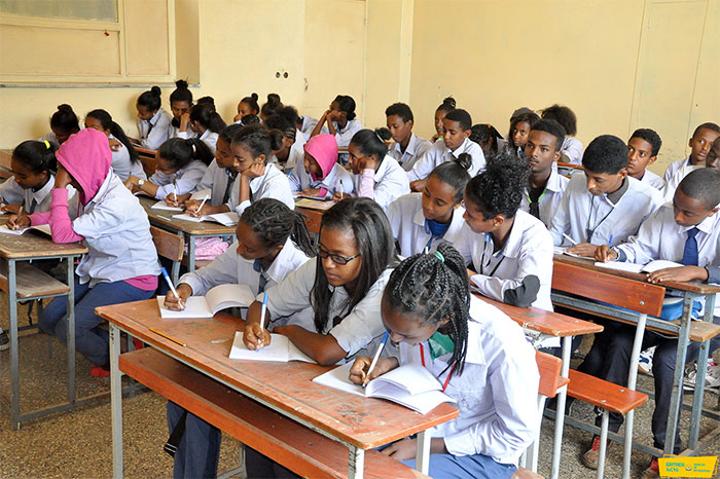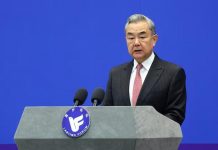Africa-Press – Eritrea. The National Education Policy of Eritrea provides a framework for the transformation and reinvigoration of the education system in order to respond to the requirements of development. Education in Eritrea is a fundamental human right and a lifelong process by which all individuals, regardless of their ethnic origin, sex and religion, are given opportunities to attain their potential as all rounded citizens. The Government of Eritrea is committed to and meets the ‘Education for All’ goal of achieving universal primary education.
The overriding national development objective of Eritrea is the creation of a modern, technologically advanced and internationally competitive economy. The Macro policy states that the key input in the attainment of this objective is the provision of “broad-based education incorporating the widespread dissemination of skills and languages and the formation of extensive human capital.”
The Government has given top priority to the production of high quality human capital that fuels the necessary transformation by mastering and exploiting the available technology, and it is investing heavily to ensure universal access to education that paves the way for the production of the desired human capital. During the past thirty years of independence, Eritrea has been able to build a resilient education system hinged on access and equity. The spread of free education across the country is a vehicle for sustainable development, success in the emerging knowledge economy, socio-economic transformation, and the formation of an equitable, just and harmonious society.
The widely distributed and freely delivered education has helped Eritreans of all ages and both genders to liberate themselves from the chains of ignorance and backwardness. The Eritrean youth are the prime beneficiaries of such an education policy. They have gained the opportunity to react to the real situation of the country. Access to education has enabled them to work on equality, liberty and fraternity. The academic and vocational ladders of education have helped Eritrean youth to climb up the mountain of knowledge and then come back to the ground to give service that would fix the challenges associated with the development of the country.
When Eritrea achieved independence in 1991, access to education was extraordinarily limited. It was clear for the government that the vision of the struggle could not be realized without making education and training accessible. The government’s strategy is to build a kindergarten in every village, an elementary school at a radius of three kilometers, one middle school at a radius of five kilometers and one secondary school at a radius of ten kilometers.
According to reports of the Ministry of Education (MoE), in 1991, there were a total of 215 educational institutions and one university. Currently, there are 1,147 educational institutions, including ten vocational schools and six colleges, with a total enrollment of over 800 thousand students. The expansion and distribution of schools in the country’s six regions is impressive. In Zoba Maekel, the number of schools has increased from 44 to 152, in Gash Barka from 50 to 306, in Zoba Anseba from 56 to 153, in Zoba Debub from 31 to 304, in Northern Red Sea from 21 to 172 and in Southern Red Sea from 12 to 54.
Education is a fundamental human right and an enabling right with direct impact on the realization of all the 17 Sustainable Development Goals that countries are working to achieve by 2030. Ensuring equitable access to education is the key to ensuring peace, prosperity and unity.
The COVID-19 pandemic has caused the largest disruption of education systems in all countries of the world. With the outbreak of coronavirus, governments all over the world have taken unprecedented measures, including the closure of schools, to contain the spread of the virus. In Eritrea, the first positive COVID- 19 case was reported on March 21, 2020, and the government undertook a proactive response to the pandemic. On 26th March, 2020, Eritrea announced the first precautionary measures, which were then reinforced by a total lockdown that has been drastically implemented since 2nd April, 2020. As part of the restrictive measures all institutions of learning, from kindergarten to colleges, were closed. Like elsewhere in the world, Eritrean students were forced to stay at home to reduce the spread of the virus. The closure of schools was a positive response by the government to protect students from risks of contracting COVID-19 because schools are places where hundreds or thousands of students meet.
Like elsewhere in the world, coronavirus has exerted tremendous challenges over all sectors of the country. Education is no exception. The lockdown that came into effect in response to COVID-19 did interrupt conventional schooling all over the country, but the Ministry of Education made efforts to maintain learning through the national media outlets.
Overtime, the government has relaxed some of the restrictive measures. In respect to education, the first relaxation occurred with the resumption of 11th and 12th grade classes as well as higher education. Later, after rigorous assessment of the situation, the MoE announced the reopening of schools throughout the country. Schools, from kindergarten to secondary schools, are now closed following the end of the 2020/2021 academic year. Similarly, college students have completed their studies for the academic year, and the colleges are preparing to graduate their students who have completed their studies and one-year community service.
The education system, like other institutions, has had to confront the pandemic that impacted the daily operations of the people. The corona virus reminds us that we need to incorporate more resilient and sustainable futures into our education system. Eritrea is known for its emphasis on community and public welfare and its investment on health and education. Eritrea’s model of administration, system of education and health have shown its capacity to respond quickly and effectively in times of adversity. When the corona virus is deeply deteriorating the life of the people of our region, Eritrea is still giving proper health care, education and other social services for its people.
Eritrea’s education system has withstood the disruption caused by the corona virus with minimum cost. The outstanding performance demonstrated at all levels of education is an evidence of the resilience of Eritrea’s education system. The commendable performance of the educational institutions in face of COVID- 19 is attributed to the high commitment of the government and educators.







